Dr Tilly Collins, from Imperial College London’s Centre for Environmental Policy, and her 16-year-old son – Douglas – spent a month this summer in the Kibale Forest of Western Uganda. Dr Collins was part of a Tropical Biology Association (TBA) team, which ran skill and capacity-building field courses to train future conservation leaders, bringing together graduate students from the host continent and the rest of the world.
In this post, Dr Collins writes a weekly log of her adventures!
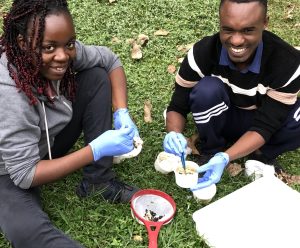
Week One: 1 August 2023
We’ve made it! Our arrival was rather a mixed affair – after smooth and comfortable flights, we landed in Entebbe and spent four hours queueing for passport control. The afternoon improved greatly when we started to meet other arriving members of the TBA team gathering at a small hotel on the shores of Lake Victoria (see the hotel sign – one of the most surprising I’ve ever seen!).
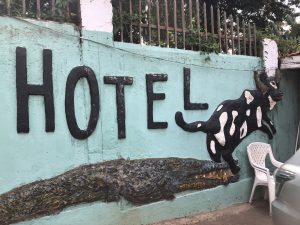
The five teaching staff all came from different countries and when the students arrived, the group had over 20 nationalities with only four speaking English as a first language – there will be much cultural exploration and discussion to come.
Many of the students were shy at first and for some it was their first international travel. Clean, from Tanzania, spoke so quietly that I had trouble understanding her, but she was buoyed-up by Kirao from Kenya and later by Brett from the Philippines, who introduced her to soap operas as a language aid.
Some were ebullient and excited to be in Africa for the first time. Jakko from Poland, Bébé from Italy and Danny from Spain chatted so welcomingly that many joined them. All are here to gain experience of tropical ecology and to learn to work with, and alongside, new and diverse collaborators. Their excitement tinged with a sense of luck and overwhelm is intoxicating.
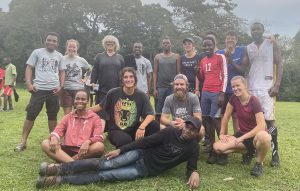
That evening, Douglas and I travelled the few miles to my friend Krystal Birungi’s house for a welcoming local supper. As well as being an entomology coordinator for Target Malaria, Krystal is a Global Fund Ambassador and travels the world advocating for support that will help eradicate malaria. Her family was warm, welcoming and lively and the food delicious. Douglas’s first evening in Sub Saharan Africa left him full and content.
Once all had arrived the next day, we headed away from Entebbe and westward towards the Rwenzori mountains. As we progressed, it grew greener and manicured tea plantations began to dominate. Then came the forest, tall, dark, noisy, rich with smells and of course, the great excitement of arriving ‘in camp’ just as darkness fell.
The Makarere University Biological Field Station (MUBFS) in Kanyawara, which houses researchers and field training programmes was much as I remembered it – reassuring and rather comforting after over a quarter of a century away. I’d spent a month here in the late 1990s as a student on the very course I am now here to help teach. There were some familiar faces with a few more wrinkles than before and I’ve followed the research emerging from the field station in the intervening decades. Lots is on primates, especially chimpanzees, but there’s an increasing theme of human-wildlife conflict.
Doug is settling well and mucking in with the students. He was the first to spot a bushbaby on a night walk, plays a real version of Temple Run on the forest trails and asks lots of good questions in classes. Our room is in one of the furthest houses in the lower part of camp and we carry sturdy anti-baboon sticks at all times. Baboons are close and curious and not afraid of me in the slightest.
Facilities are simple, we have electricity in the house and a few metres away under a big tree is long drop latrine with interesting entomological company and, in another outhouse, we have a shower that is almost warm at 16.00 on a sunny day.
Week Two: 9 August 2023
All grand here!
We (staff) have taken it in turns to teach two-day workshops on our ‘thing’. Mine involved using traps with different baits all over the different parts of the forest to get a good idea of overall insect diversity. We had water, mushed bananas and fresh baboon poop (collecting that had its moments!). It went excellently including an introduction to the fieldwork hazard of forest elephants tearing-up the pitfall traps and tearing down the butterfly traps at one of the sites… There are many insects!
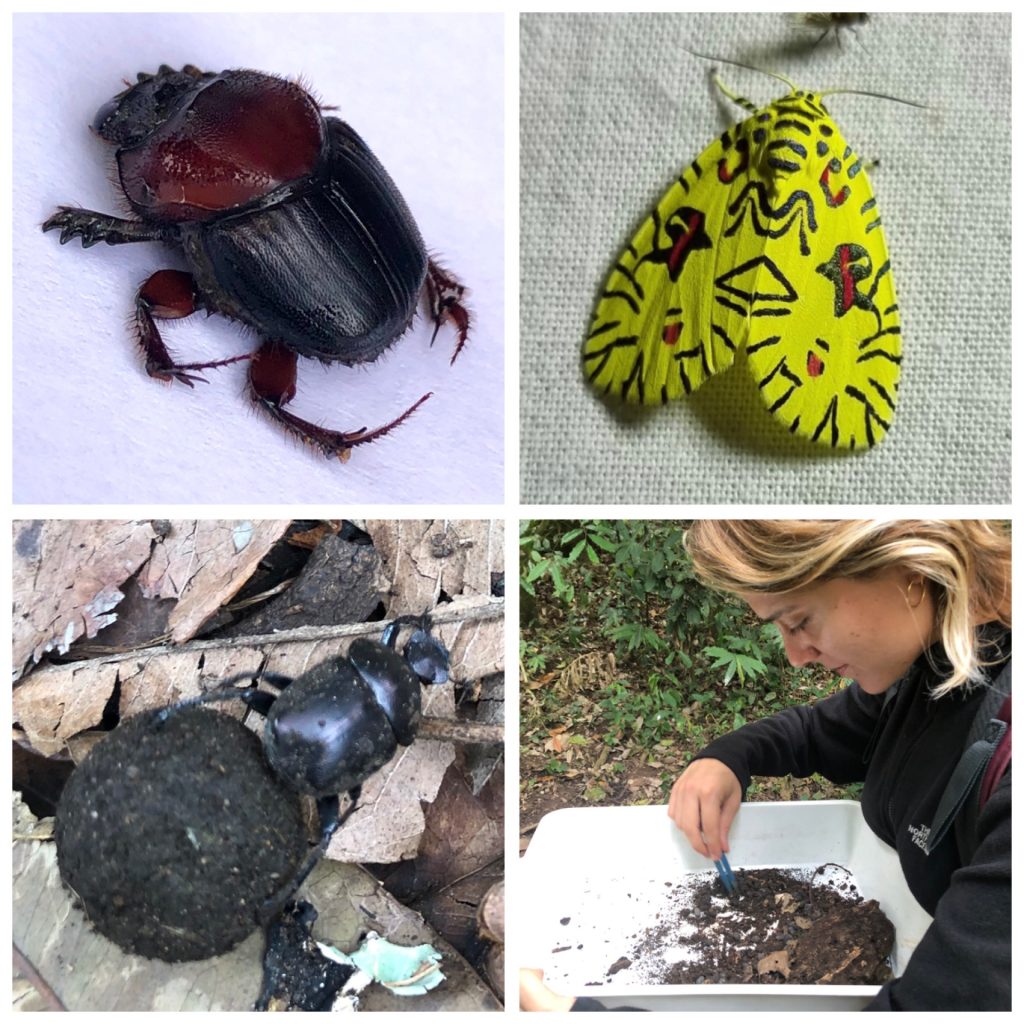
From Bernard (South Africa), they have learnt how and where to set camera traps, with Jorge (Portugal), investigated whether ‘audio-moths’ can be used to sample bird calls and with Patrick (Uganda), they have measured many trees. On top of this ‘subject and technical’ learning, they have learnt how to communicate, plan and negotiate between different view-points. This sets a foundation for their future endeavours and they will have the experience and courage to create international collaborations.
The International Conference for Conservation Biology (ICCB) that took place in Rwanda earlier in the summer is evidence of how effective this is – almost all the organizing committee were alumni of TBA courses like these.
As a mid-course break after the intensity of the teaching stage, we will soon head South over the equator to the savannah region for a couple of days. 20 km out of camp, we pass through Fort Portal, the bustling local town where we can buy useful things like brown bread, Ugandan coffee and where the 4G is remarkably good for a rapid catch-up.
The local SIM I have is rather dodgy in the forest, though Marianna (our excellent TBA team lead) has started to hang her modem from a long stick above her hut roof and that shows connection promise… Greg, the Kenyan member of TBA staff, solves this by sitting on the top of the camp hill by the water tower – though is ‘bothered’ by baboons often. That solution is not tempting me.
Week 3: 14 August 2023
It is extraordinary how the landscape can change throughout a three-hour drive. We came down from the forested hills, through larger agricultural holdings to the parched savannah and spent a couple of nights in a lakeside camp at Mwara on the Northern edge of Queen Elizabeth Park. Simple rooms, simple food and animal life galore!
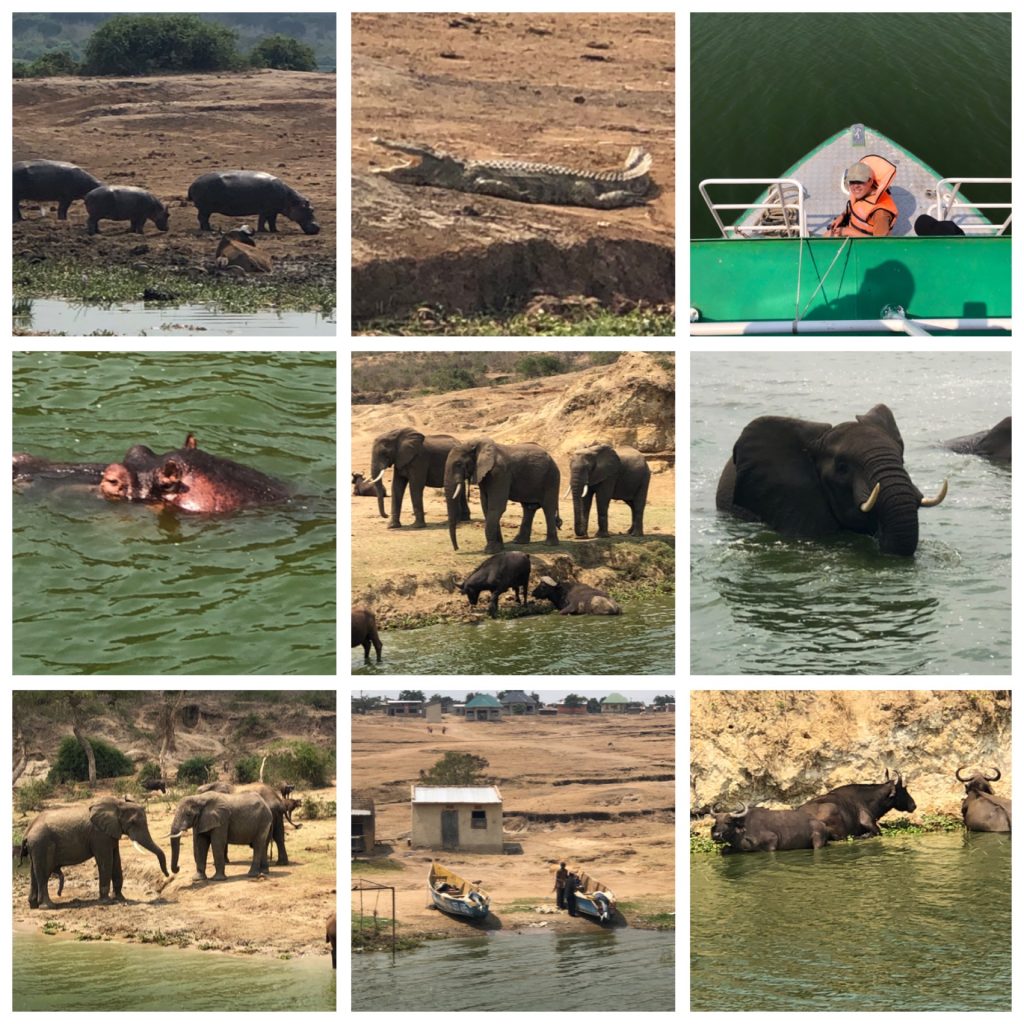
The openness of the savannah landscape allows you to see further afield and the intensity of the drought in the south brings many things to the water’s edge – so a boat trip along the Kazinga channel was in order!
All were particularly impressed by the elephants and the sight of a banded mongoose riding a warthog near the camp canteen led to a competitive flurry of ‘Lion King’ jokes.
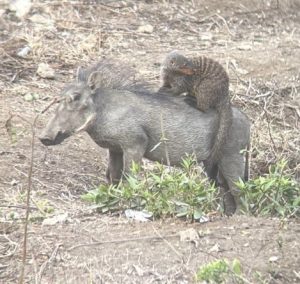
Week 4: 21 August 2023
The trip was refreshing and we headed back ‘home’ to Kibale, well-prepared and keen for the second part of the course. During this the students formed groups, planned projects, collected their data, analysed it, wrote them up and presented them to us and each other.
Within a month of leaving, the first of these projects is being presented at a conference: William from Uganda who worked assiduously with Jakko (Poland) to identify over 400 pitfall trap catches is pushing their work onto an international stage.
Uganda is beautiful and welcoming as well as disconcerting and wrapped in positional dogma. On the outskirts of the forest there are small villages of subsistence agriculturalists with low literacy where the churches dominate all community activity.
One of the greatest changes in conservation over my working life has been the acknowledgement that their voices, the voices of those whose lives are directly restricted or affected by conservation planning, are important. Links with them are critical to success.
This extends the skills needed for conservation beyond those in biology and ecology, to stakeholder engagement and social science. These students, selected by the TBA for their diversity and range of backgrounds, have learnt this and had an opportunity to practice engagement with each other and us. Learning to listen and communicate with actors beyond their daily experience will serve them forever.
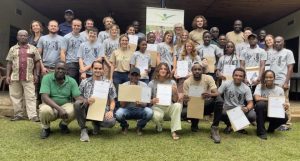
I always learn from working with new people. Their varied views contribute to such a rich tapestry, but the part of me that is a mum has also learnt. Taking a child on a trip like this was brilliant. I watched him grow in confidence and learn in his turn. I’m not sure he realised that he was a decade younger than the others and has returned to start his 6th form with a much better understanding of a wider world.